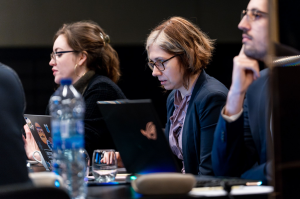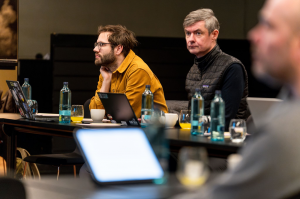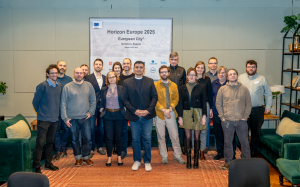
Barcelona and Europe Lead Global Innovation in Quantum Science and Democracy
Quantum-Driven Innovation in Democratic Governance Looks to the Past and the Future for Breakthroughs in Social Choice Theory
BARCELONA, CATALUNYA, SPAIN, January 24, 2025 /EINPresswire.com/ -- Barcelona and Europe Lead Global Innovation in Quantum Science and DemocracyThis week, Barcelona was home to an ambitious scientific project in democratic governance. The European City Squared (EC²) project, funded by the Horizon Europe program of the European Commission, is pioneering the integration of quantum physics, artificial intelligence (AI), and computational social science to transform collective decision-making systems.
This project, led by an international team of experts, seeks to reshape traditional democratic models by addressing critical challenges in social choice theory, representation, and fairness using principles derived from quantum mechanics.
According to Dr. Luis Razo, research and executive director of the European Institute of Science in Management (EISM) and scientific coordinator of the project: “We are exploring whether the fundamental principles of quantum mechanics, along with some of the latest advances AI and large language models, can help us design fairer and more efficient governance systems.”
A Scientific Breakthrough in Decision-Making
The core idea of EC² is to develop a new governance paradigm inspired by fundamental physics and AI. It leverages:
• Quantum-inspired models for decision-making
• Agent-based simulations (both classical and quantum)
• High-dimensional spaces to better measure preference intensity
By doing so, EC² aims to solve longstanding issues in democracy, such as the aggregation of preferences, fairness, and coherence in collective decision-making.
One of the key innovations is the application of quantum concepts like entanglement, superposition, and quantum probability to voting models. Unlike traditional systems, quantum voting models allow for more nuanced representations of voter intensity and preferences.
A key conceptual element of the EC² project is the incorporation of the Two-State Vector Formalism (TSVF). This quantum framework, championed by Prof. Eliahu Cohen of Bar Ilan University, recognizes that physical systems are best understood by considering both their past and future states. This inherently goal-oriented perspective aligns well with the nature of decision-making, where choices are influenced by past experiences and guided by future aspirations. By leveraging the TSVF, the EC² project aims to develop more nuanced and realistic models of individual and collective decision-making processes, capturing the dynamic interplay between past, present, and future.
Addressing Ethical and Political Challenges in Democracy
A major challenge in large-scale democracies is how to aggregate individual preferences into collective decisions. Classical social choice theory has struggled for centuries to develop fair and functional decision-making systems. This problem affects not only democracy but also artificial intelligence and automated decision-making algorithms.
Using quantum probability and advanced computational models, EC² aims to overcome mathematical limitations in traditional voting systems, creating more just, representative and scalable models.
Recognizing the critical importance of ethical considerations, the EC² project has established an independent Ethics Advisory Board. This board will provide guidance on all aspects of the project, ensuring that the development and implementation of quantum-inspired governance models adhere to the highest ethical standards. The board includes experts in fields such as ethics, data management, political science, and, notably, Prof. Jose Ignacio Latorre, a leading theoretical physicist and author of 'Ethics for Machines.' Prof. Latorre's expertise in quantum technology, AI, and their ethical implications will be invaluable in guiding the project towards responsible use of technology in the service of humanity.
Real-World Pilot Tests in Denmark and Switzerland
EC² will test its simulations in real-world environments in Denmark and Switzerland, two countries known for their progressive democratic models. Specifically, the city of Aarhus and QuantumBasel will host pilot programs to evaluate how hybrid quantum-classical models can improve governance and decision-making.
These experiments will measure:
• Effectiveness of quantum-inspired voting models
• Scalability and real-world applicability of new governance structures
The combination of computational simulation and practical testing makes EC² a pioneering project with the potential to redefine modern democratic systems.
Barcelona: The Global Hub for Quantum Governance Research
Catalunya is uniquely and historically fit as a hub of scientific and political innovation, from Ramon Llull’s early contributions to logic and voting theory to cutting-edge AI and quantum computing research at institutions like the Barcelona Supercomputing Center. The international consortium includes Aarhus University, the London School of Economics, Bar-Ilan University, QuantumBasel and a network of top European, American, and Israeli research institutions, positioning EC² to become a leading force in shaping the future of democracy through science and experimentation. According to Prof. Kristoffer Nieblo, director of the Center for Humanities Computing at Aarhus University and EC²’s institutional coordinator: “By integrating culture-sensitive language models into our AI pipeline, we can capture the nuanced complexity of real-world preferences, making our agent-based simulations more realistic and transforming how we design democratic systems.”
The Future of AI, Quantum Computing, and Democracy Begins Now
Over the next three years, EC² will conduct large-scale simulations, public consultations, and interdisciplinary research to design the future of democracy. The project’s ultimate goal is to develop:
• AI-driven governance tools
• Quantum-inspired voting models
• Scalable democratic frameworks
These innovations could allow governments worldwide to integrate the latest scientific advancements into decision-making processes.
For updates on European City Squared (EC²), research developments, and collaboration opportunities, visit www.eism.eu/ec2.
Leonor Gil
European Institute of Science in Management
l.gil@eism.eu
European City Squared - Barcelona Kick-Off Meeting
Distribution channels: Business & Economy, Education, Politics, Science, Technology
Legal Disclaimer:
EIN Presswire provides this news content "as is" without warranty of any kind. We do not accept any responsibility or liability for the accuracy, content, images, videos, licenses, completeness, legality, or reliability of the information contained in this article. If you have any complaints or copyright issues related to this article, kindly contact the author above.
Submit your press release


